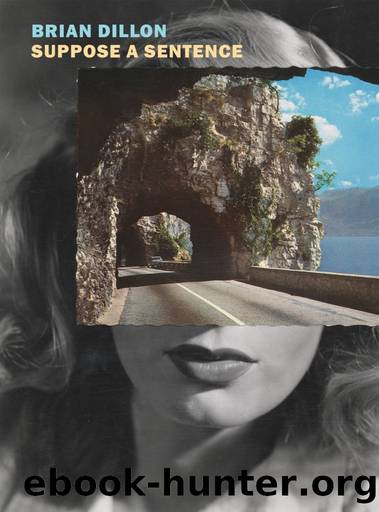Suppose a Sentence by Brian Dillon

Author:Brian Dillon [Dillon, Brian]
Language: eng
Format: azw3
Tags: Philosophy, Art, Nonfiction, Writing
ISBN: 9781913097011
Publisher: New York Review Books
Published: 2020-08-17T23:00:00+00:00
âIf that is the word I wantâ: Baldwin is making a slight show here of being careful with his language, coolly implying a distinction between Mailerâs (and a larger white cultureâs) slack use of âhipâ to appropriate the perceived liberties of African-American art or life, and the stricter sense the word maintained among black people themselves. To be hip and black at mid-century meant, for sure, to inhabit the sort of peripheral milieuâof style and sex, of drugs, art and crimeâto which Mailer in his half-invented innocence was attracted. But the âbenediction of hipâ (as the critic Ian Penman calls it) also implies a type of reserve, remoteness, austerity. Hip is a matter of codes and ciphers, hidden meaningsâbecause the alternative, in the lethal perplex of race in America, is literally to give yourself away. This is what the garrulous Mailer cannot grasp.
âThey thought he was a real sweet ofay cat, but a little frantic.â In its smooth way, it is the most damning putdown of Mailer in the whole essay. The mostly monosyllabic rhythms of the sentence and its neatly affianced sounds (âreal sweet,â âofay catâ and âfranticâ) are Baldwinâs, but they belong also to the jazz musicians he is half quoting. The sentence is an example of what is clumsily called free indirect speech: the author sounding like subject or character. It is straightforwardly comical too: hard not to think literally of Mailer as âa frantic cat.â But something else interests me in the sentence: Baldwinâs use of the word âofay,â which has a fraught and fascinating history. Superficially, it simply means white: that is, if you are African-American and intending by the word a certain degree of contempt, offence or dismissal. Quite how much hostility it expresses seems to have varied with geography and history, during a century and more of use. âOfayâ did not reach mainstream white America in the way, for example, that âhonkyâ didâthough there is some evidence to say that in parts of the United States it was the more violent epithet.
But why âofayâ? If you google the word now you will find some more or less exotic etymologies. It is said to be a Pig Latin version of âfoe.â Or, as the Dictionary of American Regional English suggests, to derive from the Ibibio language of Nigeria. (Claims of African origin have also been made for âhip,â which dates in English at least to 1904âthese seem to be fanciful.) But another origin suggests itself for âofay,â and a history that haunts Baldwinâs use of the word, which appears to me both casual and considered. The linguist Gerald Cohen has proposed that the word is a corruption of âau fait,â which was in wide use in the US by the end of the nineteenth century to mean fashionable, knowing, particular. âAu faitâ appears to have migrated to mean, among black Americans, a particular sort of white person or white culture: middle-class, condescending, excessively correct. And from there simply to mean white. In the early
Download
This site does not store any files on its server. We only index and link to content provided by other sites. Please contact the content providers to delete copyright contents if any and email us, we'll remove relevant links or contents immediately.
A New Voyage Round the World by William Dampier(537)
The Negative Trait Thesaurus: A Writer's Guide to Character Flaws by Angela Ackerman Becca Puglisi(528)
Writing Heroes and Villains (A Masterclass in Genre Fiction) by Jackson Dean Chase(484)
The Best American Magazine Writing 2020 by Sid Holt(468)
Animation and Advertising by Unknown(461)
The Positive Trait Thesaurus: A Writer's Guide to Character Attributes by Angela Ackerman Becca Puglisi(445)
Instagram for Fiction Authors: How to Find Readers, Build Community, and Sell More Books by Sandvig Hanna R(445)
Short Fiction by Gustave Flaubert(437)
The Writing Revolution: A Guide to Advancing Thinking Through Writing in All Subjects and Grades by Judith C. Hochman & Natalie Wexler(427)
Write Your Own Script by A.L. Brooks(417)
A Dictionary of Modern English Usage by H. W. Fowler;David Crystal;(405)
How to Write a KILLER LinkedIn Profile... And 18 Mistakes to Avoid: Updated for 2019 (14th Edition) by Brenda Bernstein(394)
The Best American Travel Writing 2020 by Jason Wilson(385)
The Craft of Writing Science Fiction that Sells by Ben Bova(382)
Writer's Craft Power Pack 2: Five-Book Bundle for Authors by Rayne Hall(380)
Instagram for Fiction Authors: How to Find Readers, Build Community, and Sell More Books by Hanna R. Sandvig(374)
Baudelaire and Photography by Raser Timothy;(359)
5 Steps to a 5: Writing the AP English Essay 2021 by Barbara Murphy(357)
News and How to Use It by Alan Rusbridger(353)
